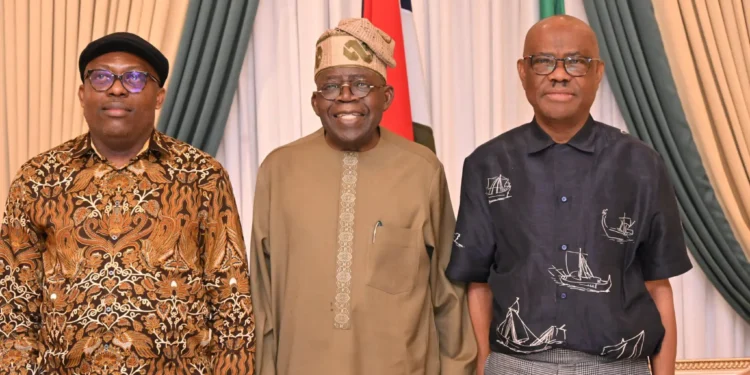President Bola Tinubu has reportedly successfully mediated a resolution to the prolonged Rivers State political crisis, agreeing to reinstate Governor Siminalayi Fubara in exchange for the governor’s commitment not to seek reelection in 2027, according to sources from the presidency.
The breakthrough agreement was reportedly reached during a closed-door meeting on Thursday night at the Presidential Villa, bringing together key stakeholders including FCT Minister Nyesom Wike, Governor Fubara, suspended Rivers Assembly Speaker Martin Amaewhule, and other prominent political leaders from the state.
The Rivers State political crisis began shortly after Fubara assumed office, stemming from his deteriorating relationship with his predecessor and political godfather, Nyesom Wike. The conflict escalated when 27 state lawmakers loyal to Wike defected from the Peoples Democratic Party to the All Progressives Congress while attempting to maintain their legislative positions, creating a constitutional and legal impasse.
The crisis deepened when these lawmakers, led by Amaewhule, initiated impeachment proceedings against Fubara, prompting the governor to suspend them from the assembly. The suspended legislators continued to conduct parallel sessions and claim legitimacy, effectively paralyzing the state’s legislative functions and creating a dangerous precedent for democratic governance.
Federal intervention became necessary as the crisis threatened to destabilize not only Rivers State but also the broader Niger Delta region, given its economic significance to Nigeria’s oil production. The situation was further complicated by legal battles over the lawmakers’ status and the legitimacy of their continued claims to legislative seats after their party defection.
According to presidency sources, under the new agreement, Fubara will reportedly complete his four-year mandate but must abandon any plans for a second term, significantly limiting his long-term political influence. The deal reportedly requires the governor to pay all outstanding allowances and entitlements owed to the 27 suspended lawmakers, who in return will cease impeachment proceedings against him.
Sources from the presidency indicate that Wike reportedly emerges as the primary beneficiary of the reconciliation arrangement. The FCT Minister will reportedly retain significant influence through his right to nominate chairpersons for all 23 local government areas in Rivers State, effectively maintaining grassroots political control that will prove crucial for future electoral cycles.
The arrangement reportedly represents a strategic compromise designed to restore democratic order while addressing the underlying power dynamics that triggered the crisis. However, the deal reportedly comes at considerable cost to Fubara’s political authority and future ambitions, limiting his ability to consolidate independent power during his remaining tenure.
A source from the presidency reportedly emphasized the president’s determination to end the prolonged crisis, stating that Rivers State could not afford continued political instability given its strategic importance to the national economy. The source reportedly described the agreement as necessary for restoring calm, though acknowledging the steep political price paid by the governor.
The resolution is reportedly expected to restore legislative functions in Rivers State and end the parallel government situation that had effectively crippled governance in the oil-rich state. However, political analysts suggest the arrangement may set concerning precedents for federal intervention in state-level political disputes and the extent to which godfathers can influence their successors’ political trajectories.



















